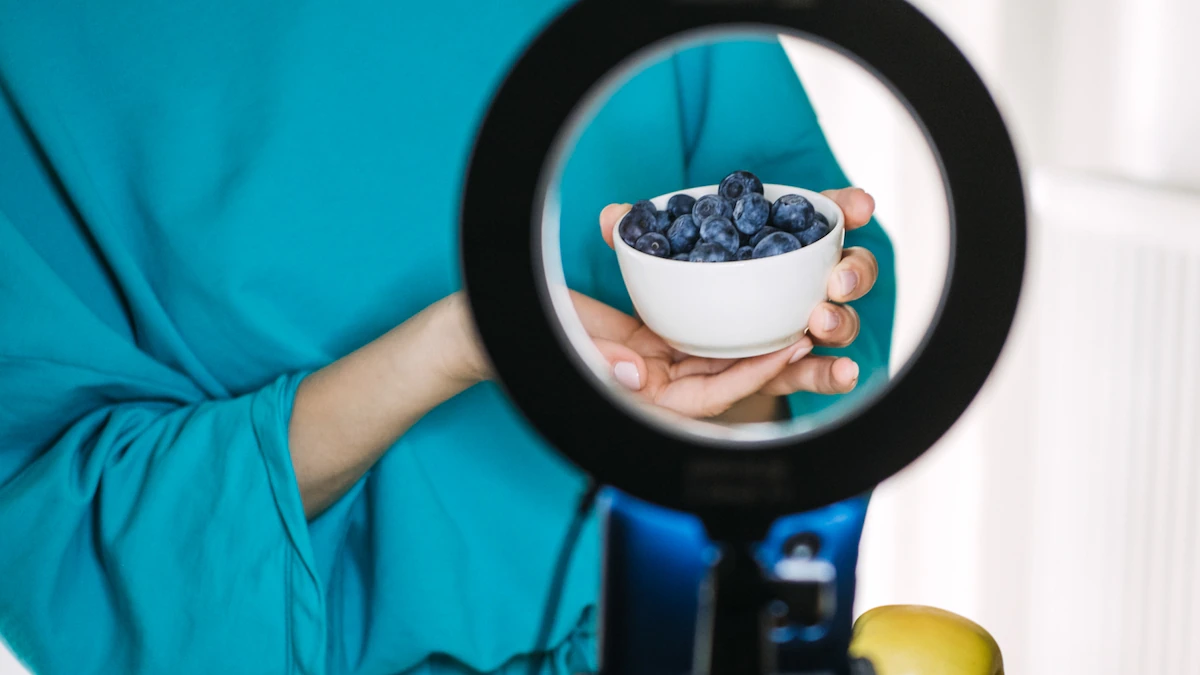
Next time you’re on social media consider this: one study evaluating influencer posts on Instagram found that 86 percent of nutrition content didn’t cite any scientific sources—and other research found inaccuracies in 45 percent of nutrition posts on the platform. Likewise, Harvard researchers found that 97 percent of popular weight loss, muscle-building, and detox supplement videos on TikTok offered no scientific evidence to support their claims.
It’s not just TikTok and Instagram; a review of 64 studies looking at a variety of social media sites and websites found that half doled out “low accuracy” nutrition information.
“Often there was a mixture of misinformation and accurate information, which can make it very challenging for social media users who are looking for nutrition guidance,” says Emily Denniss, lead author of the study and a lecturer in public health nutrition at Deakin University in Australia.
(The surprising way doomscrolling rewires your brain.)
Sydney Hurley, 27, is one of those users. She follows several Instagram profiles focusing on female wellness, which triggers a raft of links to other nutrition sites on her feed. “I see a lot of conflicting information; it can be difficult to ascertain which perspectives to trust,” says Hurley, who works for the U.S. Department of Defense in Washington D.C.
And untrustworthy advice can cause real harm. For instance, heavily promoted diets like keto and detox fasts cut out entire food groups—and nutrients. Denniss worries that promoting these restrictive diets can set people up for eating disorders. “Not to mention the wasted money spent on widely promoted dietary supplements that are often ineffective, or not needed for health,” she adds.
Much of this misinformation starts with a kernel of truth. So how can you tease out whether the advice you’re getting on social media is actually science-backed or a waste of your time? We asked experts to help us break down three popular diet trends.
Trend #1: A lectin-free diet
The claim: Some people on social media exhort their followers to avoid foods containing lectins, or proteins found in plants, animals, and microorganisms. These foods include legumes (kidney beans, lentils, and the like), peanuts, grains, and certain vegetables and fruits. They’re blamed for leaky gut, weakened immunity, weight gain, autoimmune flare-ups, organ damage, and other issues.
The kernel of truth: Consuming high amounts of certain types of lectins can cause digestive distress, including nausea and diarrhea, because they bind to sugars in the digestive tract, says Emadeldin Konozy, a research scientist at the University of Cape Coast, Ghana, who studies lectins. But that’s not the full story.
What the science says: “The idea that all plant lectins are harmful is a myth. In reality, their impact depends on their unique target, much like a key fits a specific lock,” Konozy says.
While it’s true that whole grains and legumes are particularly rich in problematic lectins, they may not pose the danger to your digestive tract that influencers would have you believe because we typically cook these foods. “Boiling them until soft effectively degrades the vast majority of these lectins, eliminating their toxicity,” Konozy says, citing research to that effect.
(Why you shouldn’t ignore lentils and peas—protein-packed superfoods.)
Meanwhile, the lectins in fruits and other vegetables aren’t a concern because their levels are very low and, in some cases, they may even be beneficial—for example, Konozy explains that certain lectins “latch onto harmful bacteria or viruses, helping to neutralize them, which could potentially provide important immunological benefits.” They may also act as antioxidants, and there’s some evidence they may have anti-cancer properties.
His bottom line: “For most healthy people, regularly eating well-cooked legumes, whole grains, and five servings of fruits and vegetables daily is not only safe but beneficial, given the fiber, protein, vitamins, minerals, and phytochemicals they provide, and, perhaps, because of beneficial lectins.”
Trend #2: The carnivore diet
The claims: On the carnivore diet, influencers recommend eating exclusively animal-based food, such as meat, chicken, and eggs, while avoiding fruit, vegetables, grains, and other carbohydrates. They claim the carnivore diet fights inflammation, lowers blood sugar, promotes weight loss, clears up brain fog, helps treat autoimmune disorders and digestive issues, contains all the nutrients the body needs—and more.
The kernel of truth: “Improving the quality of carbohydrates in your diet matters; cutting back on foods high in refined grains and added sugars (including sugary drinks) can support better health, especially when replaced with whole grains, other fiber-rich whole foods, or healthy fats,” says Renata Micha, a clinical dietitian affiliated with the University of Thessaly in Greece and Tufts University in Massachusetts.
What the science says: While there’s not long-term research into the effects of the carnivore diet, studies on red meat and health, including brain health, bode very poorly.
“The bulk of the research shows that high consumption of red, and especially processed, meat is linked to higher risks of heart disease, type 2 diabetes, some cancers, and premature death,” Micha writes in an email. “These risks increase with amount and duration of intake.”
(Want a better high-protein diet? You don’t have to eat more meat.)
Then there’s what you’re not getting: Fruit, vegetables, legumes, and whole grains. “These are foods consistently shown to benefit health,” says Micha. They’re rich in the good stuff—fiber, antioxidants, and phytonutrients. And they’re the mainstays of a healthy plant-based diet linked with lower weight, better blood sugar and cholesterol, a healthier gut microbiome, and lower risk of death from cancer and heart disease.
“As for the many claims such as reducing inflammation, ‘resetting the gut,’ or providing unique mental clarity—these are anecdotal and not supported by high-quality evidence,” says Micha. “At best, the science is preliminary or mixed, and much of what is said online is an exaggeration of limited or indirect findings.”
Trend #3: Fibermaxxing
The claims: You may have heard that you need to up your fiber intake to prevent constipation, lower cholesterol, reduce risk of heart disease and colorectal cancer, help control blood sugar, manage weight, and enhance the diversity of your gut microbes.
The kernel of truth: It’s no kernel—this is one trend that is actually true. In fact, a large crop of scientific studies indicate that dietary fiber—a carbohydrate in plants we don’t digest—lives up to the claims.
What the science says: “Dietary fiber is consistently associated with health benefits, including lower risk of heart disease, type 2 diabetes, and colorectal cancer, as well as improved gut health,” says Micha.
Fiber works its magic in a variety of ways, such forming a gel in the gut which helps slow digestion and ward off blood sugar spikes while making meals feel more filling. It lowers LDL cholesterol and increases diversity of microbes in the gut.
(Is there a link between fiber and the rise of colon cancer?)
Most people get only about half the recommended 25 g of fiber daily for women and 38 g for men. Some fibermaxxing sites push even higher-than-recommended levels but Micha says benefits plateau at 35 g to 45 g.
Nutrition experts advise upping fiber gradually, using whole grains, legumes, fruits, vegetables, and nuts instead of fiber supplements. It’s also important to get enough water to avoid constipation. Bloating, cramping, gas and/or diarrhea signals that you’re overdoing it.
Fact-checking hacks for any nutrition claim
For any other diet advice you see on social media, these fact-checking tips can help you weed out the accurate from the bogus:
Expertise. Check the poster’s bio page; a registered dietitian or someone with a degree in nutrition from an accredited college or university is usually (but not always) a more reliable source. While an “MD” may sound impressive, it doesn’t necessarily mean the person has had nutrition training; 75 percent of medical schools don’t require it.
Check against the science. The U.S. Centers for Disease Control and Prevention and National Institutes of Health websites offer consumer-friendly, evidence-based information on vitamins, minerals, dietary supplements, cholesterol, and many other nutrition topics. You may also want to check out articles on PubMed, a free database of scientific publications.
But just because a claim links out to scientific studies doesn’t mean the research supports the claims. Follow the links to be sure.
Beware of red flags. “These include anecdotal stories of symptoms or ailments being cured by a diet or supplement, those that demonize one food (like seed oils), fad diets that cut out entire food groups, and anyone trying to sell you something—such as a supplement or subscription,” says Denniss. “Also, be skeptical of shocking or novel information that contradicts what you know about nutrition. Misinformation is often designed to grab attention and boost engagement.”



